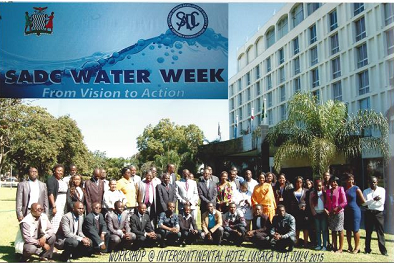The media/ youth platforms was held on Wednesday 8th July at the Cresta Golfview Hotel in Lusaka. A total of 64 participants consisting of media experts from a majority of media houses and youth from various environmental institutions and organisations attended a joint session which aimed at informing them of the actual status of water resources in Zambia. This joint session also provided them with an opportunity to familiarise themselves with the work of SADC at the regional and national level.
The youth forum and media training were both officially opened by Ms Agnes Musunga, Permanent Secretary at the Ministry of Youth and Sport who was delighted to have been invited to the meeting. She acknowledged the great importance of youth and media in anything that involves development and economic growth but most importantly, sustainability. According to her, “youth are the spearhead of tomorrow and therefore it is important to involve them in decision making”. She further alluded to the media’s critical role in disseminating information and hence the need of media to be accurately informed on current status of issues. She was hopeful that the meeting would reinforce the involvement of youth and media in monitoring and evaluation of the implementation of the decisions and national instruments such as policies and strategic action plans.
Youth Representative Evans Tembo gave a declaration on behalf of his fellow youth. He stated that despite the fact that youth in Zambia constitute more than 65% of the total population and in spite of their notable interest and passion on water resources management matters, their involvement at high levels of decision making is not yet clearly established. He assured that youth involvement could lead to innovation and creativity at all levels of decisions implementation.
Mr Christopher Chileshe gave a brief overview on the water resources in Zambia emphasizing that the growing population and the obsolete infrastructure were somehow putting strain on the effectiveness of developing and managing water resources in a sustainable way. He also mentioned that the impacts of climate change were being greatly felt in Zambia causing low river levels and ultimately resulting on low hydropower generation and power shortage in various regions of the country.
The youth had fruitful and high level discussions and were able to form a structure of 9, which they decided to call Zambia Youth20 Network. They identified key thematic areas which they deemed priorities according to their own context. Long-term capacity building topped the list, followed training and innovation.
The main national dialogue was held on 9th and 10th July at the InterContinental Hotel in Lusaka, Zambia. This second leg of the event was officially opened by Honourable Charles Zulu who reiterated that the theme “From Vision to Action” was about supporting member states to mark the strategic directions in relations with IWRM. He was further delighted that media and youth had been trained through the course of the event to that effect and informed over the last day of this important event. “Increase media capacity to integrate WRM and report accurately on water issues at local, national and regional level based on a factual analysis would be critical to accurate adaptation to climate change in our context”, said Hon. Charles Zulu. He mentioned the fact that many infrastructure projects were being taken upon at national level and that the assistance of SADC would be greatly appreciated in that regard. The national consultations brought together 55 stakeholders from various organisations as well as the Zambian government who vibrantly ensured that their voices were heard and their needs catered for in the process of developing the RSAP iV which will be implemented from 2016 to 2020.
The event resulted in fruitful deliberations and contributions which Dr Kenneth Msibi, SADC representative, assured of the incorporation along with those of all the SADC member states.
